In this digital era, the biggest struggle that startups and small businesses have is to select a good e-commerce development platform as per their budget to launch online stores.
Selecting the right e-commerce development platform from the get-go ensures that business owners can scale their business with as much ease as possible. Modifying these platforms at a later stage can cost these businesses thousands of dollars.
So from where to start? In this blog post, I will compare the four most popular eCommerce development platforms: Magento, Shopify, OpenCart, and WooCommerce. Firstly, we will take a deep look at each of these eCommerce development platforms. And then, we will analyze them on features like Security, Integration, User-friendliness, and Price.
Table of Contents
Let’s give it a quick start:
Pricing
Magento:
Magento is one of the most prominent players in the world of ecommerce and is being used on more than 200,000 online stores around the globe. It is a powerful, extremely user-friendly tool for building your online store.
Did you know? Merchants have sold goods of nearly 155 billion dollars across the world.
Magento offers two editions according to the business needs of merchants: the Magento open-source edition and the Magento commerce edition.
However, it is pretty expensive for small businesses and beginners. We at PixelCrayons provide end-to-end Magento development company services to create simple and complex enterprise-grade eCommerce websites.
WooCommerce:
WooCommerce the eCommerce store is free to download, and it doesn’t charge any transaction fees. It is an open-source WordPress plugin that allows companies to sell products online quickly.
WooCommerce can be customized and personalized for unique needs and offers many plugins to choose from. It is easy to use and can help relieve some of the workloads on small businesses that need more than just the basics in terms of features.
Moreover, the prices in WooCommerce are in the form of the type & number of extensions that you would need to install on an online store.
Being an offshore WooCommerce development company, we provide expert world-class WooCommerce development services for creating simple and complex websites.
Compare Magento and WooCommerce prices in our detailed breakdown.
OpenCart:
Since Opencart is a free and open-source ecommerce platform, it is the perfect fit for small and medium-sized businesses. It is built on a PHP framework that provides merchants an added advantage and helps them seamlessly sell products online. Opencart is popular with small business owners looking for an easy way to get their online store without paying too much money.
However, you would have to pay an extra amount similar to the case of any other eCommerce development platform to get additional features.
With 340+ full-time OpenCart developers and state-of-the-art development facilities, we have become India’s preferred offshore Opencart development company. So, if you want to get an open cart e-commerce developed, you can contact us anytime.
Shopify
Shopify is an e-commerce software that can be customized and personalized for unique needs. It also gives you all the typical features such as shopping carts, checkout, and inventory management.
You do not require installing any software on your website as everything is hosted on their servers. If you aspire to get your online shop running without having to worry about backups, hosting, or technical details, then Shopify is the perfect ecommerce solution for you.
One of the most valuable things about Shopify is that it offers 24/7 live chat support, and there’s an unlimited amount of bandwidth and storage space in your account. You can also integrate your social media accounts and blog so people don’t forget about you.
Let's connect virtually or ask for an estimate of your project.
Backed by many years of domain expertise and a team of expert Shopify developers, we provide excellent Shopify designing and development services.
Quick Comparison of Magento vs. WooCommerce vs. OpenCart vs. Shopify
Now let’s compare each of them in detail on different parameters like security, Flexibility & Scalability, performance, user-friendliness, Support, and much more.
Magento vs. WooCommerce vs. OpenCart vs. Shopify: Security
When it comes to security, Magento wins hands-down. It’s an open-source system that relies on a robust community for security patches.
You can’t say that about WooCommerce, which is a closed-source system, meaning the development team has the power to maintain the software from being distributed without their consent.
OpenCart and Shopify have been around longer than WooCommerce, but lack some of the features offered by Magento and WooCommerce.
Magento vs. WooCommerce vs. OpenCart vs. Shopify: Flexibility & Scalability
Magento is scalable because it can quickly scale to 10,000 products as it can be to one product. WooCommerce can also scale, but not nearly as quickly or without the support of third-party extensions. OpenCart is well suited to smaller businesses thanks to its open code, giving you greater flexibility in customizing your site. At the same time, Shopify has a lot more limitations in terms of scaling.
Magento vs. WooCommerce vs. OpenCart vs. Shopify: Performance
Magento has been built with a focus on performance. WooCommerce, in comparison, is a closed-source system that relies on a third-party caching system to provide enhanced performance but still suffers from performance problems.
OpenCart and Shopify have been around for much longer than WooCommerce and have improved their performance to rival Magento’s, but both are still behind WooCommerce.
Magento vs. WooCommerce vs. OpenCart vs. Shopify: User-Friendliness
The platform needs to be user-friendly and provide a high level of security. OpenCart and Shopify are designed to be very flexible and easy to use. They offer an easy way for small business owners to customize their store’s content using a drag-and-drop interface.
On the other hand, Magento also has a beautiful interface and provides complete flexibility for users to design their store’s content.
WooCommerce is a very easy-to-use content management system that provides all the functionalities a small business will need to create its online presence. It also has strong performance with easy customization options.
Magento vs. WooCommerce vs. OpenCart vs. Shopify: Upgrades and Feature Updates
Upgrading Magento is like upgrading Linux. There are several hidden costs, so you have to be patient when upgrading. WooCommerce can easily update core features with third-party extensions. As long as the extension is updated by the developer, updating WooCommerce is easy.
OpenCart updates are not that difficult or expensive, although there are some limitations. Shopify offers many restrictions for upgrading, though there are a few third-party tools available for this purpose.
Magento vs. WooCommerce vs. OpenCart vs. Shopify: Support
WooCommerce wins when it comes to supporting thanks to its large community of users that can help with any problems you might face. Magento and OpenCart come with a ticket request system based on priority, while Shopify has a support section that gives helpful tips and tutorials.
Conclusion
The above mentioned are the four top-rated and widely used ecommerce development platforms on the internet. Ultimately the decision of a small business should be a very personal one, based on specific online store needs and e-Commerce vision.
I hope you have found the blog valuable for your quest, i.e., which e-commerce development to choose? Magento vs. WooCommerce vs. OpenCart vs. Shopify. Moreover, if you need any further assistance related to eCommerce design and development, you can hire Magento developers or feel free to contact us anytime.
Explore Magento vs WooCommerce benefits to optimize your online store. Take action for a more powerful business today! Customized AR Solutions: .
Frequently Asked Questions
Q 1: Which is better, Magento or OpenCart?
OpenCart is the best choice for smaller stores because it’s more beginner-friendly and affordable. Magento, on the other hand, requires advanced technical knowledge. However, if one has a large budget with rapid growth potential, this may be worth considering.
Q 2: Which is better, OpenCart or WooCommerce?
OpenCart and WooCommerce are popular choices for e-commerce websites, but OpenCart offers a much smaller selection of extensions than WordPress’s plugin ecosystem.
If you need more features in your shopping cart with innovative add-ons like live chat support or social media integration, WooCommerce may be better suited as it has access to such an extensive library.
Q 3: What are the significant advantages of Shopify over OpenCart?
Shopify is all about making ecommerce more accessible to anyone with any budget. It explains the process for people launching their online stores, and it compiles tons of marketing resources over one place, so you can focus on what matters most for you.
Shopify ecommerce store holders can customize their store’s interface to create the perfect user-friendly experience for themselves and their customers. OpenCart doesn’t allow this.
OpenCart is an open-source e-commerce platform that uses PHP scripts, and there are also many themes available for OpenCart sites. The main disadvantage of OpenCart is the lack of support for mobile commerce, and Shopify’s mobile app allows you to perform mobile transactions quickly and easily.
Q 4: Is Magento free to use?
Magento is an open-source program, meaning you can use it for free. It runs on your web server, so the only cost you will incur is if you need to pay someone else to set up or maintain your site.
Q 5: Is OpenCart secure?
Yes, OpenCart is a very secure e-commerce platform, and it has a solid security strategy. Moreover, you need to make sure you keep the installation up-to-date and regularly change your passwords.



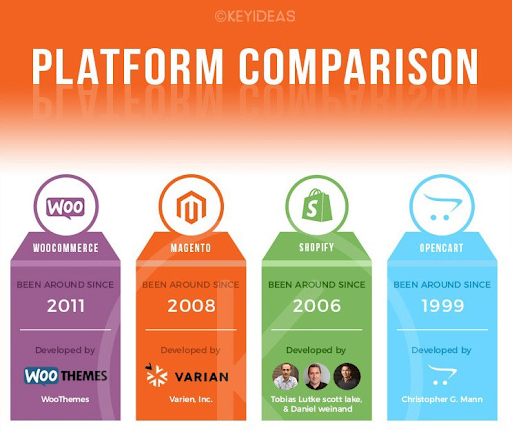

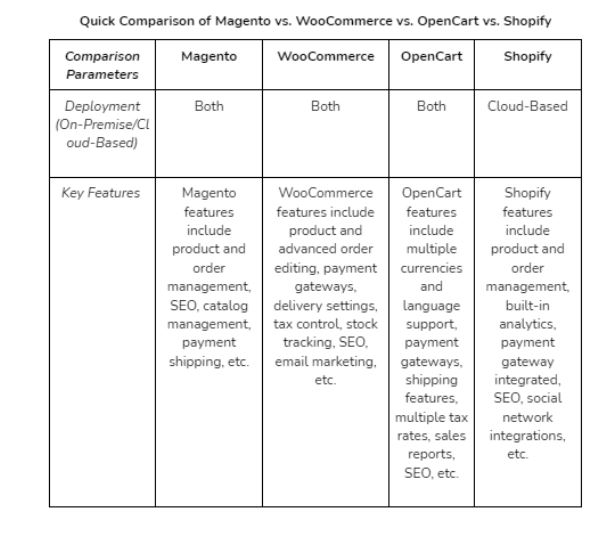
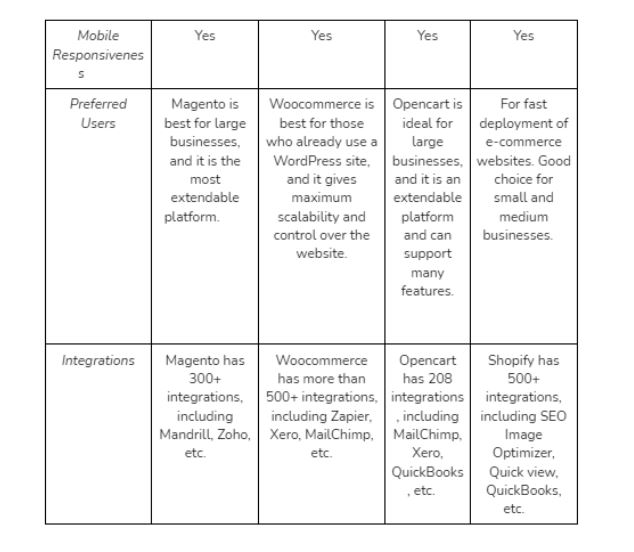
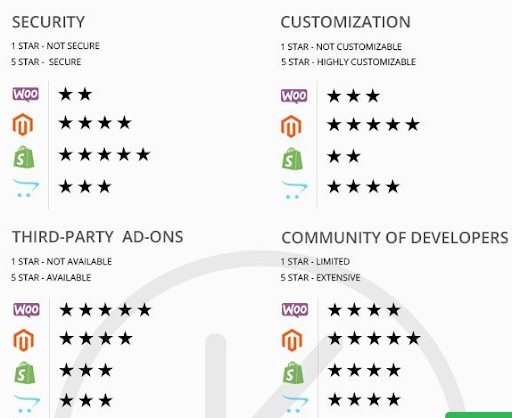
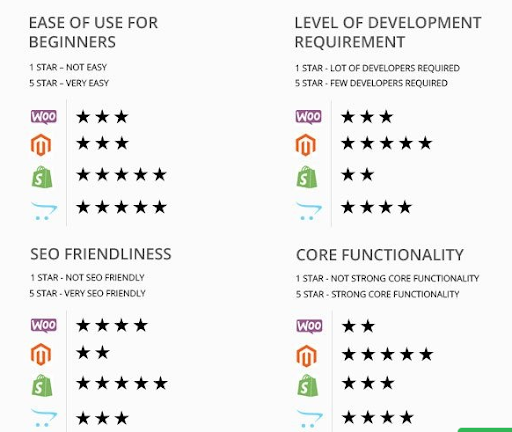



Hi, thanks for the useful post! I’m currently running a store on Magento 1 platform, but since it doesn’t receive any updates, I’m in search of a worthy alternative with advanced marketing features. The thing is that I’m not a techie, so my future platform needs to be more user-friendly. I don’t want to hire a dev everytime I need to adjust something in my store. As far as I’ve understood, Shopify is easier to comprehend. But what about the hosting provider? Can I use my old provider?
Also, I’ve tried using Cart2Cart’s migration preview service to test both platforms in action. OpenCart did seem a bit hard to operate. However, it’s great that it has lots of customization possibilities. But Shopify looks great and is very intuitive. So, I’m still at crossroads.